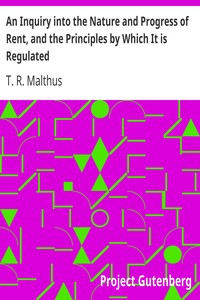| Summary |
"An Inquiry into the Nature and Progress of Rent, and the Principles by Which It Is Regulated" by The Rev. T. R. Malthus is a scholarly treatise on economics written in the early 19th century. This publication focuses on the complex concept of rent in relation to land, agriculture, and the overarching principles that influence economic conditions. Malthus, a prominent figure in the field of political economy and history, aims to dissect the dynamics of rent as it pertains to the cultivation of land and its implications on societal wealth and labor. In this work, Malthus explores the foundational causes and implications of rent, arguing against prevalent economic doctrines by investigating the relationship between land quality, agricultural yield, and population dynamics. He posits that rent arises as a natural result of the capacity of fertile land to produce more food than is necessary for the laborers who cultivate it. Through rigorous analysis, Malthus highlights three main factors contributing to high produce prices, which subsequently affect rent: the inherent quality of the soil, the demand for necessities created due to population growth, and the limited availability of fertile land. He concludes that a clear understanding of rent's nature is crucial not only for economists but also for policymakers, as it influences labor conditions, agricultural practices, and the equitable distribution of wealth within society. (This is an automatically generated summary.)
|

